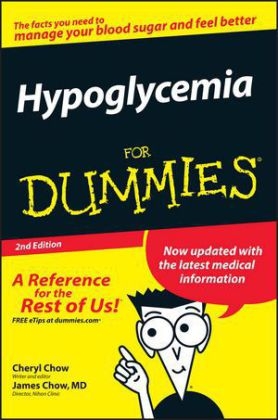
Hypoglycemia For Dummies
For Dummies (Verlag)
978-0-470-12170-2 (ISBN)
This no-nonsense, plain-English guide lays out the facts you need to maintain a healthy body.
Hypoglycemia simply means “low blood-sugar,” but without concrete symptoms it’s very hard to diagnose. It is nevertheless a condition that should be watched over carefully. People react differently to low blood sugar as well as to the treatment they receive. Hypoglycemia for Dummies explores this fickle condition and shows you how to manage your blood sugar to feel better. It offers expert advice on identifying symptoms, changing lifestyles, and also extensive coverage on diet, exercise, alternative treatments, and the link between low blood sugar and diabetes. This expanded 2nd edition provides:
A thorough explanation of hypoglycemia and how it affects your body
Exercise routines that lead to a healthier lifestyle
Diet suggestions on what to eat and how often
A basis for choosing a doctor that’s right for you
Vitamins and supplements that treat your symptoms
Ways to manage hypoglycemia in the workplace
An explanation of how hypoglycemia affects family and friends
Methods to de-stress yourself
Complete with tips on helping other hypoglycemics and myth-debunking facts about the disease, Hypoglycemia for Dummies is the fast and simple way to learn and treat the condition, with the help of the most up-to-date medical information available. Escape the blood sugar blues and starting feeling better in no time!
Cheryl Chow has been a writer, editor, and journalist for more than 20 years. James Chow, MD, is a member of the American Academy of Family Medicine.
Introduction 1
About This Book 1
Conventions Used in This Book 2
What You’re Not to Read 2
Icons Used in This Book 3
Foolish Assumptions 3
How This Book Is Organized 3
Part I: Addressing Your Ups and Downs: Could This Be Hypoglycemia? 4
Part II: Diagnosing and Treating Your Hypoglycemia 4
Part III: Emulating Lifestyles of the Well and Healthy 4
Part IV: Spinning a Network of Support for Yourself (and Others) 4
Part V: The Part of Tens 4
Where to Go from Here 5
Part I: Addressing Your Ups and Downs: Could This Be Hypoglycemia? 7
Chapter 1: Riding the Blood Sugar Roller Coaster Isn’t Any Fun 9
Defining Hypoglycemia 9
Organic 10
Relative 10
Reactive 11
Like a Greased Pig: Easy to Define, Tough to Pin Down 11
Identifying key symptoms 13
Arriving at a diagnosis 13
Knowing Who’s Prone 15
Prevailing problem: The pudge! 15
Like a couple of hooligans: Linking hypoglycemia and diabetes 16
Heading Toward Better Health 16
Chapter 2: Digesting Hypoglycemia: Your Body’s Role 19
Absorbing Some Physical Food 19
Breaking down proteins 20
Pancreas plays its part 21
Insulin gone awry 23
Tracing Cause and Effect 24
Multiple causes 24
Exhausting your adrenals 25
Ravaging your health: The couch and the potato 26
Sugar, sugar, everywhere — except where you need it 27
Addressing Addictions: The Link to Low Blood Sugar 28
Chapter 3: Symptoms without a Cause 31
Jumping on Stage: No, You’re Not Faking It 31
Eying the Physical Symptoms 32
Identifying the Emotional Symptoms 33
Unmasking Hypoglycemia’s Hidden Faces 35
Reactions to food 36
Overlapping syndromes 39
Haggling with hypothyroidism 41
Joining the hypo bandwagon: Hypoadrenalism 42
Hypoglycemia and Diabetes — Flip Sides of the Same Coin? 43
Looking at the syndrome flowchart 43
Identifying the types of diabetes 44
Nailing Down Hypoglycemia: Symptoms throughout the Ages 46
Hypoglycemia and newborns 46
Hypoglycemia and children 47
Hypoglycemia and pregnant women 47
Hypoglycemia and menopausal women 48
Hypoglycemia and older people 48
Part II: Diagnosing and Treating Your Hypoglycemia 49
Chapter 4: Matching Up with the Right Doc 51
Why Seeing a Doc on a Regular Basis Is Important 51
Paging Dr. Perfection 52
Knowing what to look for in a doc 53
Finding the right doc 54
Dealing with doubters 56
Choosing a Specialist 56
Internists and family doctors 57
Endocrinologists 57
Preparing Shows You’re Caring (About Yourself) 58
What to take to your appointment 58
Following up after the appointment 61
Putting Some Ohhhhmm into It: Alternative Medicine 62
Defining your alternatives 62
Considering your alternatives 63
Working in tandem 65
Chapter 5: Getting the Lowdown on Low Blood Sugar. 69
Poking and Prodding Yourself 69
Filling in the circles: A questionnaire 70
Eating by trial 72
Getting the 411 on Hypoglycemia Testing 73
The pros and cons of these tests 74
What to expect from the tests 75
How your doc interprets the results 78
Graphing your own results 80
Chapter 6: Gorging on Good Health 85
Of Food Pyramids and Healthy Eating 86
Re-designing the familiar pyramid 86
Building a hypoglycemic pyramid 87
Keeping your diet in balance 89
Shunning problematic foods 90
The World’s Your Oyster and Your Pear — Foods to Eat 91
Life’s a bowl of cherries: Fruits 92
Vegging out isn’t a bad thing 94
The squeaky hypoglycemic gets the grease: Fats 96
Powering up with proteins 98
Doing dairy 99
Breaking the proverbial camel’s back: Breads and grains 99
Eating the Right Way 101
Starting off on the right foot 101
Eating six meals — or more — a day 103
The most important meal 103
Sizing up your servings 104
Getting back on the wagon if you’ve fallen off 105
Adding helpful food substitutes 106
Hypoglycemia in Vegetarians: What Can You Eat? 107
Chewing on a Food Journal 108
Knowing what to record 108
A food journal isn’t just for food 109
Tracking your progress 110
Chapter 7: Hanging with Herb and His Buddies Vitamin and Supplement. 111
Getting Acquainted with Herb 111
Saying Hello to Supplements and Vitamins 112
Vitamins and minerals 112
Supplements 113
Taking the Hypoglycemia Mix 114
Matching Supplements to Ails: Which Makes You Feel Better? 119
Anxiety 120
Asthma 121
Chronic fatigue syndrome 122
Constipation 122
Depression/mood swings 123
Digestive problems 125
Fatigue and energy drain 127
Fibromyalgia 128
Headaches 128
Insomnia 129
Low sex drive 130
Memory problems/poor concentration 131
Midafternoon slump 132
Nausea 133
Poor circulation 133
Stress 134
Water retention 135
Table of Contents ix
Taking a Whiff: Aromatherapy 135
Rocking Bach’s Flower Remedies 136
Part III: Emulating Lifestyles of the Well and Healthy 137
Chapter 8: Easing Symptoms and Energizing with Exercise 139
Why Exercise Is Important When Battling Hypoglycemia 139
Easing Your Way into Exercise 141
Modifying your behavior 141
Finding the time to exercise 142
Timing Your Carbs 142
Improving Insulin and Feeling the Burn: Aerobics 143
Strut your stuff and work that walk 144
What’s the difference, you ask? Running and jogging 146
Shaking your groove thang: Dancing 147
Regulating Blood Sugar with Yoga and T’ai Chi 148
Going yoga 148
Taking T’ai Chi 149
Kicking Weakness with Weights 150
Building endurance with bodyweight workouts 150
Easing into free weights with body weights 152
Incorporating free weights into
your exercise regimen 152
Clearing Brain Fog with Qigong 153
Chapter 9: All Stressed Out and Nowhere to Go. 155
How Stress Impacts Your Hypoglycemia 155
Determining Your Stress Level 156
Knotting Off: Relaxing Your Tight Muscles 157
Taking a Deep Breath to Relax 159
Breathing helps regulate your blood sugar 159
Trying some deep-breathing exercises to relax 160
Surfing the Alpha Wave with Meditation 161
Balancing your blood and body 162
Energizing with EFT 164
Kicking food cravings in the gut 168
Making the Ultimate Smoothie: Hypno-Soothing 171
Chapter 10: Defanging the Depression Demons 173
Revealing Another Epidemic 174
Knowing What (Gray) Matters 175
Getting Comfy on the Couch 176
Mastering new thinking skills 177
Thinking healthy 178
Easing through the transition 179
Beating the Low Blood Sugar Blues 180
Stop being so SAD 180
Taking a swing at your mood 181
Discussing dietary plans 182
Feeling Out Antidepressants 184
Identifying the different drugs 184
Considering antidepressants? Know both sides of the story 186
Working with a psychiatrist 187
Chapter 11: Making It through Your Day at Work 189
No Rings around Either: Blue and White Collar Workers 190
Hard hat area 191
Tie required 191
Addressing Your Boss and Co-Workers 192
Knowing when (and how) to tell your boss and co-workers 192
Knowing when not to tell 193
Flying with the legal eagles 194
Finding practical solutions 195
Framing your condition positively 196
Putting Up a Cot in the Cubicle?
Managing Long Work Hours 197
Gettin’ in the groove with work 197
Breaking up your work day 198
Preparing for those long hours when you’re away from the office 199
Diffusing Work-Related Stress 200
Evaluating your life: Does this job impede your health? 201
Passing up the caffeine 202
Creating a cozy cubicle 203
Part IV: Spinning a Network of Support for Yourself (and Others) 205
Chapter 12: Jockeying for Support 207
Grasping the Link between Support and Hypoglycemia 207
Getting Yourself Out There 208
Getting to Know Me 209
Joining the In-Crowd 212
Netting some help 213
Doing the 12-step 215
Buddying Up 218
Matching up with a buddy 218
Starting off on the right foot with your buddy 219
Chapter 13: Dealing with Friends and Family: Eat and Let Eat. 221
How Hypoglycemia Can Affect Your Relationships 221
Explaining to Your Significant Other 222
Starting with open dialog 222
Helping your significant other cope 223
Talking to Your Children about Hypoglycemia 224
Keep it simple 224
Be prepared for questions 225
Reiterate that they didn’t make you sick 225
Involving the Whole Family 226
Can we talk? 226
Helping your loved ones help you 227
When can we eat? 228
Dealing with the Doubting Thomases 230
Staying clear of negativity 230
Avoiding conflict 231
Maintaining your boundaries 232
Sabotaging the saboteurs 233
Chapter 14: Suffering Along with Your Sweetie? 235
Introducing Mr. (or Ms.) Hyde 236
Understanding Hyde’s condition 236
Identifying Hyde’s symptoms 237
Talking It Over 237
Starting with the four Rs 238
Giving these words the green light 239
Stopping negative talk 240
Offering Your Offspring Support 241
Jumping In with Both Feet (and 2.5 Kids, a Dog, and a Cat) 242
You Be Betty Crocker and I’ll Be Julia Child 243
Part V: The Part of Tens 245
Chapter 15: Ten Myths about Hypoglycemia 247
Hypoglycemia Doesn’t Exist 247
Hypoglycemics Lack Willpower 248
Eating Sugar Is a Quick Fix 248
One Diet Fits All 249
Eliminating the “Bad” Foods Is All You Have to Do 249
You Can’t Be a Vegetarian if You’re Hypoglycemic 250
Having a “Cheat Day” Is Okay 250
Sugar Can Be Part of a Healthful Diet 251
Hypoglycemics Should Eat Low-Fat Diets 251
Blood Glucose Levels Remain the Same throughout the Day 252
Chapter 16: Ten Hints for Helping Hypoglycemics 253
Acting Practically at Home 253
Testing for Sugar 254
Controlling Blood Sugar 254
Dining Out: The Do’s and Don’ts 255
Food Facts for Tasty Health 257
Noshing on Nourishment 258
Eating Brainy Foods 259
Banishing Brain Fog 259
Remembering How to Deal with Short-Term Memory Loss 261
Changing Successfully 262
Index 263
| Erscheint lt. Verlag | 23.3.2007 |
|---|---|
| Sprache | englisch |
| Maße | 155 x 234 mm |
| Gewicht | 408 g |
| Einbandart | Paperback |
| Themenwelt | Sachbuch/Ratgeber ► Gesundheit / Leben / Psychologie |
| Medizinische Fachgebiete ► Innere Medizin ► Endokrinologie | |
| ISBN-10 | 0-470-12170-X / 047012170X |
| ISBN-13 | 978-0-470-12170-2 / 9780470121702 |
| Zustand | Neuware |
| Informationen gemäß Produktsicherheitsverordnung (GPSR) | |
| Haben Sie eine Frage zum Produkt? |
aus dem Bereich


